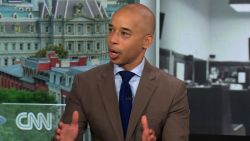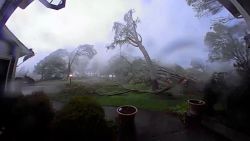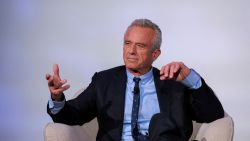Editor’s Note: Allison Hope is a writer whose work has been featured in The New Yorker, The New York Times, The Washington Post, CNN, Slate and elsewhere. The views expressed here are her own. Read more opinion on CNN.
The pernicious force of anti-LGBTQ hate isn’t only a threat to those who identify as LGBTQ. The devastating killing of Laura Ann “Lauri” Carleton, 66, of Cedar Glen, California, was a tragic reminder of this harsh truth.

Police said suspected shooter Travis Ikeguchi, 27, killed Carleton after an argument about a Pride flag outside of her boutique. Sheriff Shannon Dicus said Ikeguchi had yelled “many homophobic slurs” at Carleton and torn down the flag, shooting her when she confronted him. Ikeguchi fled, dying later in a shootout with deputies.
Carleton did not identify as LGBTQ; according to the store’s web site, she and her husband were married for 28 years and shared a “blended family of nine children.” Carleton’s daughter Ari told CNN that the store’s Pride flag had been torn down previously, but was always replaced with a bigger one.
According to tributes being paid by family and friends, Carleton was a committed ally to the LGTBQ, an average citizen supporting her community and neighbors and friends. And she paid the ultimate price, one a person should never have to pay for merely displaying a symbol of acceptance and inclusion.
It feels as if America has emerged from a viral medical pandemic only to be consumed by a moral pandemic, fueled by hate that is poisoning our hearts and minds. It is making people hate and turn against one another, to fear and punish that which makes us different rather than embracing what makes us unique and our common humanity.
This moral pandemic is spreading in the form of increased hate crimes against LGBTQ and other minority communities, as censorship of innocuous forms of entertainment and expression, including books and drag shows. It is fueled by extremist politicians passing restrictive laws and policies that erase LGBTQ people from school curricula and library shelves (not to mention banning any materials that might make White people feel bad about racism or that depict slavery as negative), that deny transgender people access to public facilities, sports teams and even potentially life-saving health care.

This contagion is real and there appears to be no vaccine in sight. “LGBTQ+ Americans are living in a state of emergency. The multiplying threats facing millions in our community are not just perceived — they are real, tangible and dangerous,” the Human Right Campaign’s president, Kelley Robinson, said in June when they issued a national state of emergency for the first time in its history as an organization. And those threats, as everyone who mourns Carleton now knows too well, imperil allies and anyone who stands up for our civil society, as well as those at the front lines.
At a news conference Monday, local sheriff’s office officials said that the suspected shooter had social media accounts with anti-LGBTQ and anti-law-enforcement material, including an X account (formerly known as Twitter) with a burning Pride flag as its pinned post. That a Pride flag, which threatens no one and aims only to show that all are welcome, could spark a deadly confrontation for a non-LGBTQ ally in the year 2023—in a little town not far from the big city of Los Angeles on the “left coast”—is proof of the nightmare growing among us.
A Pride flag is a tremendous symbol during an exigent time. It’s a way to signal to a young LGBTQ person, who might be bullied at school or rejected at home, that his life is worth something. It’s a sign to new residents, who may feel alone or unsure in an unfamiliar place, this can feel like home.
Those of us who are LGBTQ and those of us who are allies fly this flag so that our children can feel proud, not fearful or ashamed, and to show that our allies — business owners, elected officials, neighbors and strangers — acknowledge our humanity. We raise the flag to remind us of how far we’ve come and why we can’t go back.
The Pride flag is not merely a frivolous adornment; it is a concrete and powerful marker that we don’t bow down to bullies; that we are principled and have integrity and are willing to stand up for what’s right and just. It’s a symbol of hope and promise that all are welcome here, even if we still aren’t welcome everywhere.
We know the power of the Pride flag because those who aim to dehumanize us have tried to take it away. There’s no more poignant example of that than what happened to Lauri Carleton.



















